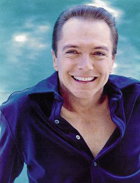
David Cassidy on the Web
Heartthrob has found peace
April 3, 2007
By Hannah Stephenson
www.icberkshire.icnetwork.co.uk
Some 35 years ago, 15,000 teenyboppers gathered outside a top London hotel to get a glimpse of their American idol, whose long wavy hair, gleaming smile, hairless torso and dreamy love songs, including Could It Be Forever? and Cherish, left them weak at the knees.
Today, I meet David Cassidy in The Dorchester, the same establishment which was mobbed by the fans and made TV news all those years ago at the height of his fame.
Some of my friends played truant to get to the hotel early for a good vantage point of their hero's room, I recall. He laughs and tells me the fans serenaded him to sleep every evening outside the building.
"The hotel management was aghast. The idea that I was causing all this commotion was totally unacceptable.That was the last time I was able to stay at a London hotel for the entire 70s," he says.
David's now 56 and in a happier place than he's been for a long time. After years of therapy, two failed marriages and prolonged anger over unresolved issues with his late father, he finally seems to have found peace with himself.
At the height of his popularity in the early 70s he felt trapped in a bubble,creatively stifled as the image-makers promoted him as a teenage idol. For 10 years after his premature retirement in 1974 he couldn't bring himself to sing a David Cassidy hit.
"I love singing those songs now. My job is to bring people out of their existence in this moment in time. When they come to see me they can forget about everything else for a couple of hours.
"Now the trivial has become so much more important, whereas I used to think of my job as fluff. Since 9/11 I don't think about it like that any more.Having brought light into people's lives doing something artistic and creative has so much value for me now.
"It took me a long, long time to give myself any kind of break, to say, 'Good job,David'. It took me a lot of years of lying on a couch to see that."
He now lives in Florida with his wife, songwriter Sue Shifrin, and their 16-year-old son Beau, and has also recently become close to his 20-year-old daughter Katie (from a previous relationship with an ex-model), after earlier refusing to support her pop career. She is now doing well as an actress.
"Katie now understands that I couldn't support her wanting to become the next Britney Spears when she was 15. She's glad it didn't happen for her then.
"I talk to her almost every day. I wanted her to stay in school, learn her craft and she knows I was right. She's now making a film with Liam Neeson and landed the lead in the movie of Dallas, playing Charlene Tilton's role. I'm really proud of her."
At his peak, David Cassidy was the world's highest paid live entertainer and his official fan club was the largest in pop history.
He took full advantage of the fact that girls threw themselves at him and has lost count of the number he slept with - but there was no time to form lasting relationships.
The gruelling tours, loss of privacy and frustration at not being allowed more creative licence came to a head in 1974, when he decided to quit at the peak of his career.
"I think I lived under a blanket for half of the 70s," David writes in his autobiography.
"I didn't have a moment to reflect on the success," he says now."In five years I had one vacation. By 1974 I was still emotionally only 19 years old. I hadn't lived life. I'd just worked."
At his 40,000-strong concert at White City Stadium in London during his last world tour in 1974, 14-year-old schoolgirl Bernadette Whelan was crushed to death by the crowd. The incident, about which David was deeply upset, cemented his resolve to quit at the end of the tour.
Soon after retiring, he suffered a nervous breakdown, hid himself from the world and resorted to alcohol and drug abuse.
He expected to have made enough money to do as he pleased for the rest of his life. But ruthless business associates and poor management lost him a fortune. By the mid-80s he was broke.
But he reflects that much of his unhappiness rested with his father,actor Jack Cassidy, who divorced David's mother, actress Evelyn Ward, without David's knowledge when he was three.
It wasn't until two years later when David's friends were taunting him at school about the divorce that he plucked up the courage to ask his father.The shock he suffered at learning his parents were no longer together was immense.
"My father was away a lot because of work, and I'd be told he was on tour. For two incredibly narcissistic people as my mum and dad were, it was the easiest,most convenient way to deal with it. It gave me a love trust issue which has been the root of a lot of my sadness - that, and the abandonment issue with my dad.
His father, a manic depressive and alcoholic,went on to marry Shirley Jones,who played David's mother in The Partridge Family. David had a great relationship with his stepmother and still sees her.
When he found fame in The Partridge Family,his father became resentful, he recalls."He was jealous of me.He had lived with 15 years of being Mr Shirley Jones. Shirley was a famous movie star, something he desperately wanted to be but never was. Then when I found success people addressed him as David Cassidy's father, not as Jack Cassidy."
In the 80s David resumed his career,starring in the stage musical Time and then going on to appear in Blood Brothers on Broadway and in London with his brother Shaun.
He worked his way out of debt and also started training, racing and breeding thoroughbred horses, a passion of his for many years.
He reflects that nowadays his family is the most important element in life,and he no longer yearns for the approval he once craved from all those around him.
"I used to care so much.I wanted everyone to appreciate me and to see how I cared. Now I think,if you don't like it that's okay, enough people do.
"I love my work. I'm really good at what I do. I can play, I can sing and I can act.
"I get to do what I want. I'm driving the bus now.The bus ain't driving me anymore."
Could It Be Forever? My Story, by David Cassidy, is published by Headline, priced £18.99. Available now.
